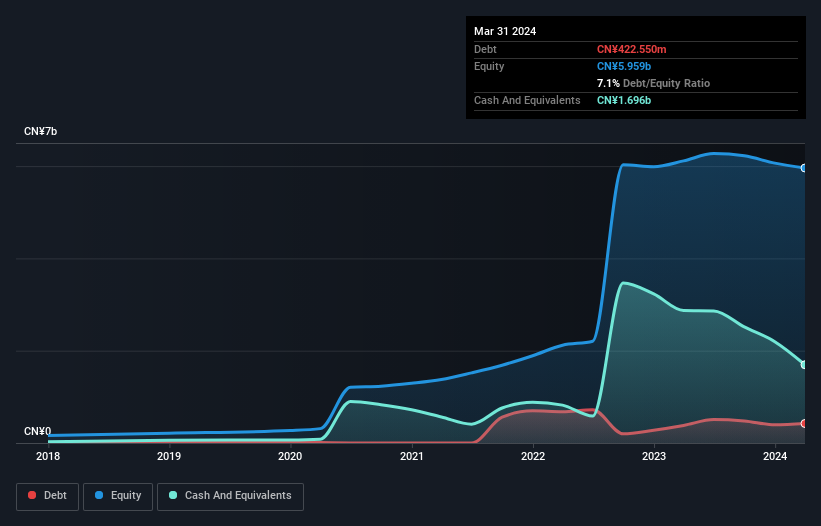Is KBC Corporation (SHSE:688598) Using Debt In A Risky Way?
David Iben put it well when he said, 'Volatility is not a risk we care about. What we care about is avoiding the permanent loss of capital.' So it seems the smart money knows that debt - which is usually involved in bankruptcies - is a very important factor, when you assess how risky a company is. As with many other companies KBC Corporation, Ltd. (SHSE:688598) makes use of debt. But the more important question is: how much risk is that debt creating?
When Is Debt Dangerous?
Debt assists a business until the business has trouble paying it off, either with new capital or with free cash flow. In the worst case scenario, a company can go bankrupt if it cannot pay its creditors. However, a more frequent (but still costly) occurrence is where a company must issue shares at bargain-basement prices, permanently diluting shareholders, just to shore up its balance sheet. Of course, plenty of companies use debt to fund growth, without any negative consequences. The first thing to do when considering how much debt a business uses is to look at its cash and debt together.
View our latest analysis for KBC Corporation
What Is KBC Corporation's Net Debt?
The image below, which you can click on for greater detail, shows that at March 2024 KBC Corporation had debt of CN¥422.6m, up from CN¥381.0m in one year. However, its balance sheet shows it holds CN¥1.70b in cash, so it actually has CN¥1.27b net cash.

A Look At KBC Corporation's Liabilities
Zooming in on the latest balance sheet data, we can see that KBC Corporation had liabilities of CN¥590.5m due within 12 months and liabilities of CN¥400.0m due beyond that. On the other hand, it had cash of CN¥1.70b and CN¥880.5m worth of receivables due within a year. So it can boast CN¥1.59b more liquid assets than total liabilities.
This surplus strongly suggests that KBC Corporation has a rock-solid balance sheet (and the debt is of no concern whatsoever). On this view, lenders should feel as safe as the beloved of a black-belt karate master. Succinctly put, KBC Corporation boasts net cash, so it's fair to say it does not have a heavy debt load! The balance sheet is clearly the area to focus on when you are analysing debt. But it is future earnings, more than anything, that will determine KBC Corporation's ability to maintain a healthy balance sheet going forward. So if you want to see what the professionals think, you might find this free report on analyst profit forecasts to be interesting.
Over 12 months, KBC Corporation made a loss at the EBIT level, and saw its revenue drop to CN¥972m, which is a fall of 25%. To be frank that doesn't bode well.
So How Risky Is KBC Corporation?
While KBC Corporation lost money on an earnings before interest and tax (EBIT) level, it actually booked a paper profit of CN¥30m. So when you consider it has net cash, along with the statutory profit, the stock probably isn't as risky as it might seem, at least in the short term. With mediocre revenue growth in the last year, we're don't find the investment opportunity particularly compelling. The balance sheet is clearly the area to focus on when you are analysing debt. But ultimately, every company can contain risks that exist outside of the balance sheet. For example KBC Corporation has 3 warning signs (and 1 which makes us a bit uncomfortable) we think you should know about.
When all is said and done, sometimes its easier to focus on companies that don't even need debt. Readers can access a list of growth stocks with zero net debt 100% free, right now.
Valuation is complex, but we're here to simplify it.
Discover if KBC Corporation might be undervalued or overvalued with our detailed analysis, featuring fair value estimates, potential risks, dividends, insider trades, and its financial condition.
Access Free AnalysisHave feedback on this article? Concerned about the content? Get in touch with us directly. Alternatively, email editorial-team (at) simplywallst.com.
This article by Simply Wall St is general in nature. We provide commentary based on historical data and analyst forecasts only using an unbiased methodology and our articles are not intended to be financial advice. It does not constitute a recommendation to buy or sell any stock, and does not take account of your objectives, or your financial situation. We aim to bring you long-term focused analysis driven by fundamental data. Note that our analysis may not factor in the latest price-sensitive company announcements or qualitative material. Simply Wall St has no position in any stocks mentioned.
About SHSE:688598
KBC Corporation
Engages in the research and development, production, and sale of carbon-based composite materials and products in China and internationally.
High growth potential with mediocre balance sheet.
Market Insights
Community Narratives


Recently Updated Narratives

Constellation Energy Dividends and Growth

CoreWeave's Revenue Expected to Rocket 77.88% in 5-Year Forecast

Bisalloy Steel Group will shine with a projected profit margin increase of 12.8%
Popular Narratives


MicroVision will explode future revenue by 380.37% with a vision towards success


NVDA: Expanding AI Demand Will Drive Major Data Center Investments Through 2026



